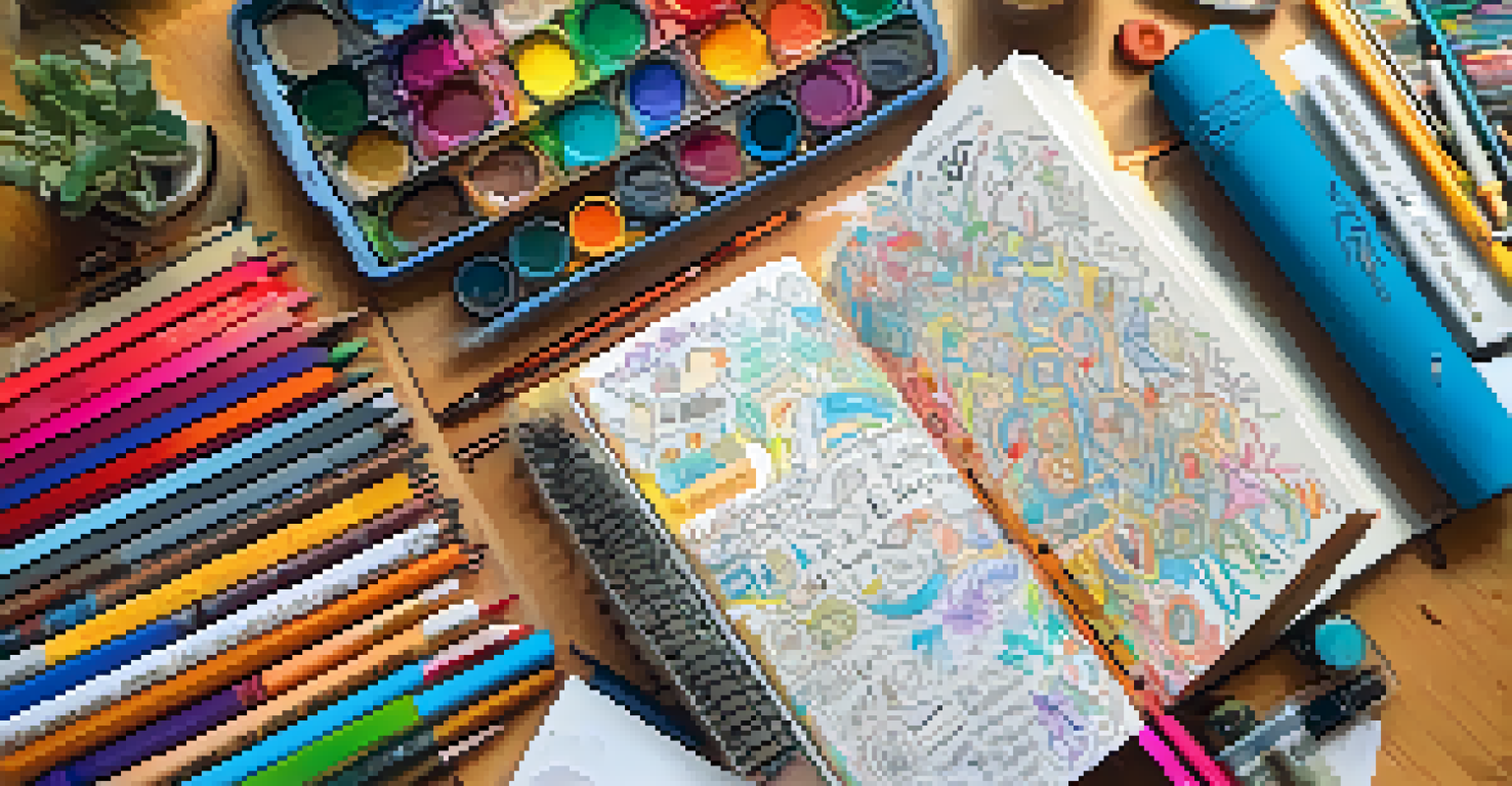Understanding Yourself: The Power of Journaling for Self-Discovery

What is Journaling and Why Does it Matter?
Journaling is simply the practice of writing down your thoughts, feelings, and experiences. It serves as a mirror, reflecting your inner self back to you. This process can be incredibly powerful for self-discovery, as it helps you to articulate emotions that might otherwise go unexamined.
Journaling is like whispering to one's self and listening at the same time.
By putting pen to paper, you create a tangible record of your thoughts, allowing you to track patterns, changes, and growth over time. This ongoing dialogue with yourself can reveal insights about your behaviors, motivations, and desires that might not be apparent in the hustle and bustle of daily life.
Moreover, journaling can act as a safe space for you to explore complex feelings without fear of judgment. This freedom can lead to greater self-acceptance and understanding, making the act of journaling not just a habit, but a crucial tool for personal development.
The Therapeutic Benefits of Journaling
Engaging in regular journaling can provide numerous mental health benefits. Studies suggest that writing about your emotions can reduce stress and anxiety by helping you process and cope with overwhelming feelings. It’s a bit like untangling a knot; once you start writing, the chaos in your mind begins to clear.

Additionally, journaling has been shown to boost mood and even enhance memory. When you write down your experiences, you reinforce the memory of those moments, making it easier to recall positive events and feelings later on. This practice can create a positive feedback loop, where you find joy in reflecting on your past.
Journaling for Self-Discovery
Journaling acts as a mirror for self-reflection, helping you articulate emotions and track personal growth.
Furthermore, journaling allows you to identify negative thought patterns. By recognizing these cycles, you can work on reframing your thoughts, ultimately leading to healthier perspectives and improved emotional resilience.
Finding Your Unique Journaling Style
Not all journaling is the same, and finding a style that resonates with you can make all the difference. Some people thrive on structured prompts, while others prefer free-writing, where they let their thoughts flow without restriction. Experimenting with different styles can help you discover what feels most authentic to you.
The act of writing is the act of discovering what you believe.
Visual journaling, for instance, incorporates drawings, doodles, or collages alongside written entries. This creative approach can deepen your self-exploration, especially if you find words limiting. Think of it as a canvas where your thoughts and feelings can take shape in whatever way they wish.
You might also consider gratitude journaling, where you focus on the positive aspects of your life. This practice can shift your mindset and promote a greater sense of happiness, making it a valuable addition to your self-discovery journey.
Setting the Right Environment for Journaling
Creating a conducive environment for journaling can enhance your experience. Choose a quiet space where you feel comfortable and free from distractions. Think of it as your personal sanctuary, a place where you can dive deep into your thoughts without interruption.
Lighting can also play a significant role; soft, ambient light can create a calming atmosphere. Adding personal touches, like your favorite blanket or a scented candle, can make the space feel more inviting and encourage regular journaling sessions.
Mental Health Benefits of Writing
Regular journaling can reduce stress and anxiety, boost mood, and enhance memory by processing emotions.
Remember, the goal is to cultivate an environment that fosters creativity and introspection. The more you enjoy your journaling space, the more likely you are to return to it regularly, making it a key component of your self-discovery journey.
Overcoming Writer's Block in Journaling
It's common to hit a wall sometimes when journaling, often referred to as 'writer's block.' This can be frustrating, especially if you're eager to explore your thoughts. One way to combat this is to start with simple prompts or questions to get the creative juices flowing.
For instance, you could ask yourself, 'What am I grateful for today?' or 'What challenges did I face this week?' These questions can serve as gentle nudges, helping you to ease into deeper reflections without feeling overwhelmed.
Additionally, try not to put too much pressure on yourself to write perfectly. Remember, journaling is a personal exploration, not a polished essay. Allow yourself to write freely, even if it feels messy or disorganized; the goal is to express, not impress.
Reflecting on Your Journal Entries
Reflecting on your past journal entries can be a powerful tool for self-discovery. It allows you to see how you've grown, what patterns have emerged, and how your thoughts have evolved over time. By reviewing your entries, you can gain insights into your emotional journey and recognize recurring themes in your life.
Consider setting aside time each month to revisit your writings. This practice can reveal not just your progress but also areas where you might want to focus on personal growth. It’s like looking through a window into your own life, providing clarity and perspective.
Creating a Supportive Environment
Establishing a comfortable and inviting space for journaling fosters creativity and encourages regular practice.
Reflection can also reinforce the lessons learned and the emotions felt during your writing sessions. By acknowledging your progress, you can cultivate a sense of gratitude for your journey, empowering you to continue exploring and growing.
Integrating Journaling into Your Daily Routine
Integrating journaling into your daily routine doesn’t have to be a daunting task. Start small—commit to writing for just 5 to 10 minutes each day. This manageable time frame can help you develop the habit without feeling overwhelmed, making it easier to incorporate into your life.
Consider pairing your journaling with another daily ritual, like your morning coffee or your evening wind-down. This association can make it feel like a natural part of your day, rather than an added chore. Before you know it, it may become a cherished moment of reflection.

Ultimately, consistency is key. The more regularly you journal, the deeper your self-discovery will be. So find a time that works for you, and make journaling a delightful part of your daily routine.